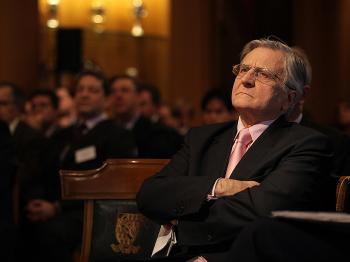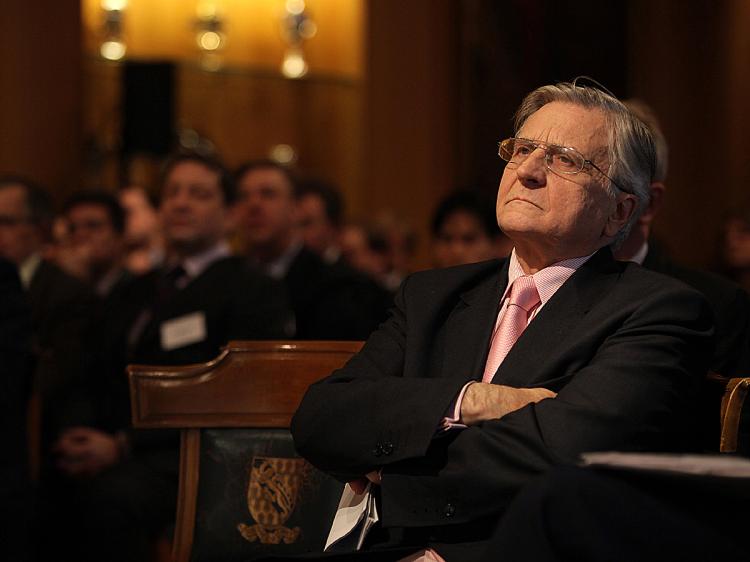Following a good finish to 2009, the biggest Eurozone economies have finally overcome the global recession. However, the 16-country block is now facing a huge debt crisis—due to heavy borrowing by nations to battle the recession—seen in Portugal, Italy, Ireland, Greece and Spain.
The most severe debt case is seen in Greece, whose credit rating has been lowered by all major rating agencies. Its budget deficit has reached 12 percent of its GDP, which is four times higher than the Eurozone limit. The Greek government is desperately trying to lower its debt by taking aggressive budget cuts in public spending, which as a result has triggered a lot of public unrest on the streets of Athens.
If the situation in Greece does not improve, it is bound to be stranded in a deep credit crisis, dragging the rest of the Eurozone together and weakening the euro currency.
“We all share a common responsibility,” said Angela Merkel, positioning Germany in actively helping Greece to relieve its credit pains.
If some of the stronger Eurozone’s members such as Germany and France don’t rush in and rescue Greece by absorbing some of its debt, there is a possibility of the country being tossed out of the Eurozone.
The European Central Bank (ECB) is taking a hard line and has not signaled that it is willing to bail out any separate member.
“One has to be very clear: The ECB has no mandate or intention to take into account the situation of a specific country, especially not with regard to public finances,” said Ewald Nowotny, the member of the ECB’s Governing Council in an interview with The Wall Street Journal.
Analysts predict that when the economies of Germany, France, the Netherlands and Finland show significant improvements, which they already have, the laggards such as Greece, Spain, Ireland and Portugal will be put to a real tough test, as they simply would be not able to keep up.
“If inflation picks up in France and Germany, the smaller economies will be left behind in stagnation and deflation,” said Jordi Gali, a Spanish economist from Barcelona. “Such an asymmetric recovery is pretty likely, and if the ECB raises rates, it could get very ugly,” he added, referring to the possibility of ECB raising interest rates for borrowing credits in order to accommodate more successful powerhouses such as Germany and France and the economy of the Eurozone as the whole.
Meanwhile, in December, the euro has lost more than 5 percent against the dollar. If the fall of the euro continues, it would put an increasing pressure on the lagging countries and would create a very visible separation between the core and peripheral states, thus further creating disharmony.
The most severe debt case is seen in Greece, whose credit rating has been lowered by all major rating agencies. Its budget deficit has reached 12 percent of its GDP, which is four times higher than the Eurozone limit. The Greek government is desperately trying to lower its debt by taking aggressive budget cuts in public spending, which as a result has triggered a lot of public unrest on the streets of Athens.
If the situation in Greece does not improve, it is bound to be stranded in a deep credit crisis, dragging the rest of the Eurozone together and weakening the euro currency.
“We all share a common responsibility,” said Angela Merkel, positioning Germany in actively helping Greece to relieve its credit pains.
If some of the stronger Eurozone’s members such as Germany and France don’t rush in and rescue Greece by absorbing some of its debt, there is a possibility of the country being tossed out of the Eurozone.
The European Central Bank (ECB) is taking a hard line and has not signaled that it is willing to bail out any separate member.
“One has to be very clear: The ECB has no mandate or intention to take into account the situation of a specific country, especially not with regard to public finances,” said Ewald Nowotny, the member of the ECB’s Governing Council in an interview with The Wall Street Journal.
Analysts predict that when the economies of Germany, France, the Netherlands and Finland show significant improvements, which they already have, the laggards such as Greece, Spain, Ireland and Portugal will be put to a real tough test, as they simply would be not able to keep up.
“If inflation picks up in France and Germany, the smaller economies will be left behind in stagnation and deflation,” said Jordi Gali, a Spanish economist from Barcelona. “Such an asymmetric recovery is pretty likely, and if the ECB raises rates, it could get very ugly,” he added, referring to the possibility of ECB raising interest rates for borrowing credits in order to accommodate more successful powerhouses such as Germany and France and the economy of the Eurozone as the whole.
Meanwhile, in December, the euro has lost more than 5 percent against the dollar. If the fall of the euro continues, it would put an increasing pressure on the lagging countries and would create a very visible separation between the core and peripheral states, thus further creating disharmony.






